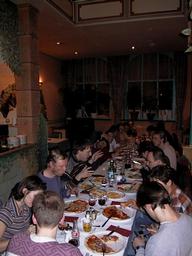
Mother Nature had decided that it should rain on the weekend of 2-3. February 2001 in Belgium. And it did. But that didn't stop over 600 visitors to attend the Open Source and Free Software Developers' European Meeting, taking place at the Université Libre de Bruxelles.
OSDEM was organised right after Linux Expo in Paris, which for its part helped to attract almost 30 well known speakers to tell about their free software projects and participate in round table discussions. The audience consisted of developers and advanced users, so most of the presentations were rather technical. However, political issues were also a hot topic, especially the dangers of software patents.
This report follows my usual style and is written in the form of a travel story.
See also
I arrived to Brussels on Friday evening directly from Linux Expo in Paris, travelling with my French friend Thomas Tempé. Our first goal was to find our way to Leuven, a smaller city about 30 kilometers outside Brussels. A party had been announced to take place there and Peter Vandenabeele had been kind enough to offer us free accommodation.
OSDEM was not a commercial event but organised by volunteers, most of whom were members of BxLUG, a local Linux users' group. Just before the conference was scheduled to start the situation was still a bit chaotic. The lobby was full of people and the organisers were adding the final touches to the program, answering questions and trying to find coffee for a few thirsty people all at the same time.
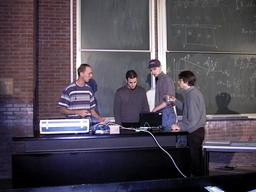
|
In the main amphitheatre the responsable organiser Raphael Bauduin (on the left) was taking care of his group, still downloading the latest software on the laptop reserved for demonstrations. But well in time before the half an hour reserved for the introduction was over Raphael took the microphone for a few minutes. He wished everyone welcome to the event and asked the speakers to keep in schedule. Amazingly enough, it actually worked through the whole conference! |
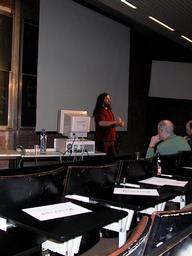
|
The first topic was dangers of software patents, presented by Richard Stallman, the founder of the Free Software Foundation. He presented the various difficulties that individuals and small companies face when either trying to get benefit from their own patents or avoid breaking others. In addition he brought up a few new arguments I hadn't heard before. |
Stallman explained that software engineering differs from other patentable fields because when writing software one doesn't have to worry about material difficulties. Being able to ignore things like temperature changes, voltage variations and sound vibrations saves a lot of time and money. That allows the average programmer to put much more features into a program than an average machine designer can construct in his machine, and thus walk further on the patent minefield. A big program always operates in the scope of several dozen patents, and it is impossible to keep track of them all.
At the moment software is not patentable in Europe, but it might be in the future. At the end of his talk Richard asked the audience to look for more information at http://www.freepatents.org and sign the petition at http://petition.eurolinux.org.
During the whole conference there were always two or three presentations going on in parallel in different auditories. Saturday's program offered looks to specific projects like Mozilla and Crystal Space 3D engine and a series of presentations related to network security. I followed the security track.
Werner Koch told about the technology behind the Gnu Privacy Guard (GnuPG), a free solution for encrypting e-mail communications using public key cryptography. Richard Morrell presented Smoothwall, an easy to install Linux firewall from a project manager's point of view. He didn't go into details but revealed a classic success story of a few programmers opening up their project and encountering immediate interest and growth. The main catalyst in this case was SourceForge, a project hosting site which makes collaboration easy.
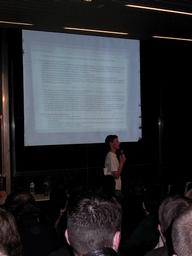
|
Nmap author Fyodor didn't need fancy slides to explain how to use his tool to investigate network structure and detect firewall misconfigurations. An amazing wealth of information compressed into 90 minutes and complemented with hacker humor fully deserved the big aplodes from the packed amphitheatre. Fyodor's notes are already available on-line. |
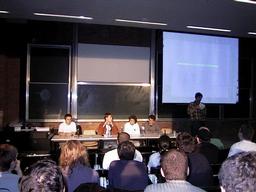
|
Renaud Deraison's talk of Nessus, an application level security scanner finished the software presentations and the discussion session started. Topics included many subjects recently discussed in the media and explanation why it is nearly impossible to detect afterwards if a machine has been compromised or not. Intrusion detection software and Solar Designer's Linux kernel patches from the Openwall project were recommended. |
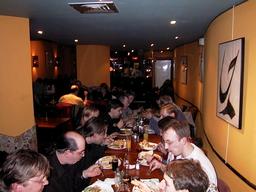
|
The discussions continued again in a nearby restaurant. The organisers had planned a party in the city center, but we heard rumors of various problems including the proposed place being already full and headed back to Leuven. |
Last update 17.8.2001.